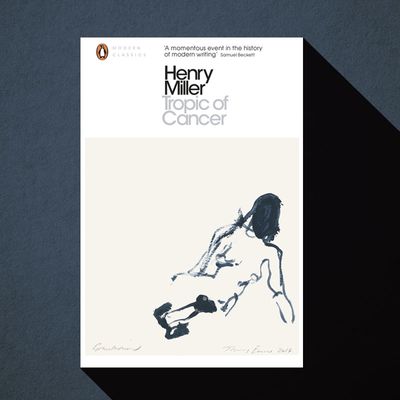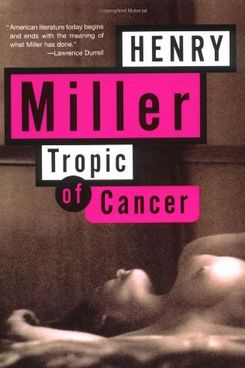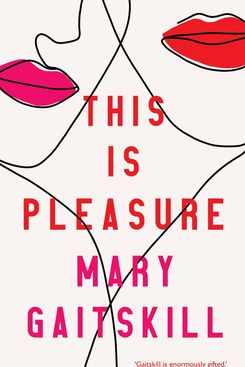
Novelist and short-story writer Mary Gaitskill, author of, most recently, This Is Pleasure, selects a passage from Henry Miller’s 1934 novel Tropic of Cancer. Although Miller’s work is famously “dick-centric,” the passage that stuck with Gaitskill all these years later was about a prostitute named Germaine who spoke of her vagina with great admiration as an object “she prized above everything in the world.” Over the last nine decades, many have called Miller’s work misogynist, but to Gaitskill, Germaine was a feminist, a sex-positive icon before the term existed.
Germaine was different. There was nothing to tell me so from her appearance. Nothing to distinguish her from the other trollops who met each afternoon and evening at the Cafe de l’Elephant. As I say, it was a spring day and the few francs my wife had scraped up to cable me were jingling in my pocket. I had a sort of vague premonition that I would not reach the Bastille without being taken in tow by one of these buzzards. Sauntering along the boulevard I had noticed her verging toward me with that curious trot-about air of a whore and the run-down heels and cheap jewelry and the pasty look of their kind which the rouge only accentuates. It was not difficult to come to terms with her. We sat in the back of the little tabac called L’Elephant and talked it over quickly. In a few minutes we were in a five franc room on the Rue Amelot, the curtains drawn and the covers thrown back. She didn’t rush things, Germaine. She sat on the bidet soaping herself and talked to me pleasantly about this and that; she liked the knickerbockers I was wearing. Tres chic! she thought. They were once, but I had worn the seat out of them; fortunately the jacket covered my ass. As she stood up to dry herself, still talking to me pleasantly, suddenly she dropped the towel and, advancing toward me leisurely, she commenced rubbing her pussy affectionately, stroking it with her two hands, caressing it, patting it, patting it. There was something about her eloquence at that moment and the way she thrust that rosebush under my nose which remains unforgettable; she spoke of it as if it were some extraneous object which she had acquired at great cost, an object whose value had increased with time and which now she prized above everything in the world. Her words imbued it with a peculiar fragrance; it was no longer just her private organ, but a treasure, a magic, potent treasure, a God-given thing — and none the less so because she traded it day in and day out for a few pieces of silver. As she flung herself on the bed, with legs spread wide apart, she cupped it with her hands and stroked it some more, murmuring all the while in that hoarse, cracked voice of hers that it was good, beautiful, a treasure, a little treasure. And it was good, that little pussy of hers! That Sunday afternoon, with its poisonous breath of spring in the air, everything clicked again. As we stepped out of the hotel I looked her over again in the harsh light of day and I saw clearly what a whore she was - the gold teeth, the geranium in her hat, the rundown heels, etc., etc. Even the fact that she had wormed a dinner out of me and cigarettes and taxi hadn’t the least disturbing effect upon me. I encouraged it, in fact. I liked her so well that after dinner we went back to the hotel again and took another shot at it. “For love,” this time. And again that big, bushy thing of hers worked its bloom and magic. It began to have an independent existence — for me too. There was Germaine and there was that rose-bush of hers. I liked them separately and I liked them together.
I first discovered Henry Miller at 15 or 16, when I read Kate Millett’s book Sexual Politics. She made him sound like the dirtiest son of a bitch on the planet, and made his work sound more degrading than it actually is. There would be the passage, and there would be these outraged words around it, which heightened everything. I’m sure she didn’t intend this, but it actually had the effect of making it more exciting, because when things sound really bad, they tend to be really exciting. I was outraged by what I read of Henry Miller but I was also really excited by it, because it sounded so extreme.
I immediately went out to find some Henry Miller to see just how bad he might be. But when I finally read Tropic of Cancer, the context made it very different. It was clear to me that he was writing about his experience of the world, and the world he was in was very rough. People were starving. Everybody was in a raw, desperate state, unless they were somebody with money, in which case, everyone wanted to prey on that person and get as much as they could out of them. The sexuality was just one part of that really raw, physically desperate — but also physically exuberant — environment, and it read differently that way. Reading Millett, you got the impression that the sexuality was a hell-pit you fell into, and it was these incredibly intense feelings of contempt and loathing that were somehow miraculously connected to orgasm. But reading Tropic of Cancer, I got the feeling that it wasn’t so clearcut. He was truly obsessed with women, and with these raw forces that keep meeting each other through people. Sometimes I laughed at the descriptions of the women. The passages just seemed so much about Miller wanting to feel his importance and his power — it seemed ludicrous. But at the same time, it seemed like the women were just out of their minds with excitement. This is when I thought, God, that sounds great.
The passage I picked, I don’t remember reading it and feeling turned on, exactly. But this was one I remembered for years and years. I haven’t looked at this book since I was 17 or 18, but I’ve always remembered this one because it struck me as being beautiful and warm. It was very different from some of the other passages. He seems to really … not love Germaine, of course. (I think at one point he says he could no more love Germaine than he could love a spider.) The term “sex-positive” had not been invented yet, but I would definitely call it that. He thinks her pussy is great. She thinks it’s great. She is totally happy with it. I particularly like this line: “She spoke of it as if it were some extraneous object which she had acquired at great cost, an object whose value had increased with time and which now she prized above everything in the world. Her words imbued it with a peculiar fragrance; it was no longer just her private organ, but a treasure, a magic, potent treasure, a God-given thing — and none the less so because she traded it day in and day out for a few pieces of silver.”
Most of what I remember of Miller’s writing is incredibly dick-centric. This is one of the few passages I remember where he’s praising someone’s vagina. And the portrait of her is just so vivid. I remember her having gold teeth and trotting around in the street, aggressively looking for customers and throwing back a drink. There’s a feeling of her as a person, but also that she has acquired this at great cost — she’s obtained this love for herself and ability to have great pleasure with effort. It hasn’t just been handed to her.
Reading Miller for myself made me realize that people could have very complicated feelings about sex. That somebody could view men or women with, on the one hand, disgust and contempt, but then that could quickly in another moment turn into admiration or desire or adoration, even. It made me realize that even somebody like Miller, who had originally been presented to me as an example of all that was anti-woman, was a more complicated person than that. I tend to be drawn to mixed people and mixed feelings.
I believe that in art, the things you wouldn’t want in real life can be entertained or understood, or even seen and examined. When I read Miller, part of what was exciting to me was that these men he wrote about just didn’t seem to give a fuck — and in some ways, the women didn’t either. Even though, certainly in real life, I’d want a man that I was with to give a fuck, to care about me, it was exciting to read about a world where maybe, sometimes, you wouldn’t want that at all. I still think that’s important to have — a place in art where you can be exposed to a different way of being.
Talking about writing sex scenes can be more uncomfortable than writing them. When you’re writing, you’re alone with yourself, and it’s very intimate. You’re not thinking about how other people will see it, or at least I don’t. I have had the experience of choosing to read something in front of people that included a sex scene and not realizing how embarrassed I would be by it. I just hadn’t thought what it would be like to say the words. There’s a funny anecdote I once read about Henry Miller, by Anais Nin. It was in one of her diaries. She talked about how when Miller became a celebrity for his writing, women would come up to him at parties and say, “So who’s your latest cunt?” And he would blush and turn away. He was embarrassed. He didn’t know what to say. Writers are more reticent than you would think. People sometimes assume things about me that are not true, or act in weird ways toward me that clearly seem based on what I’ve written, that don’t have anything to do with me.
Today, I don’t think any man would dare write what Miller wrote, which is unfortunate. Although at the time, too, he was not approved of — he couldn’t get published in America for a long time. People thought he was disgusting then, as well. For a while, writing about sex was almost the purview of women. Women could write more intensely about sex and it would be accepted in a way it wasn’t from men. I think the reason for that is pretty obvious — women are less threatening than men.
Writing about sex is kind of like writing about music. It’s a thing that isn’t about words, really, and doesn’t lend itself to verbal descriptions. When I’m writing sex scenes, I don’t ever think about how the scene is going to unfold. I just put myself there with the people, and they do what they do. I don’t think people ever know why anything is erotic. I don’t think we need to know. People often know what they like, although if they’re lucky they might be surprised. But I do think it’s mysterious.



